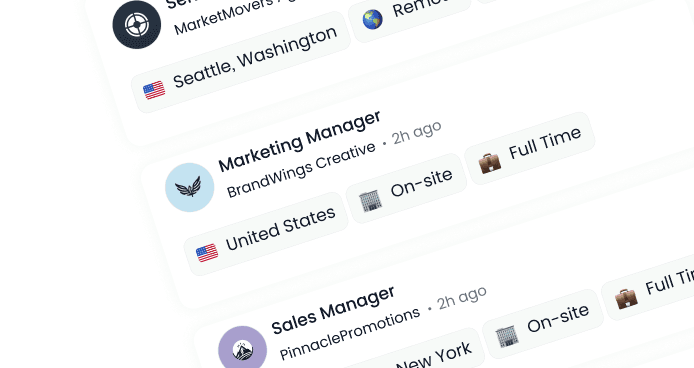How AI Job Boards Improve Soft Skills Evaluation in Hiring
Published:
October 27, 2025
All
AI Recruitment
Recruiting Tips
Employer Branding
Workforce Planning
Soft skills decide who thrives — but resumes can’t show them. See how AI job boards finally close the gap.
Main Takeaway
Traditional hiring overlooks soft skills until it’s too late.
AI job boards structure and scale how communication, teamwork, and adaptability are evaluated — with humans still making the final call.
The winning formula? AI for insights. People for judgment.
The Soft-Skills Blind Spot — And Why It Matters Now
One of the main problems with traditional resumes is that they are just words on paper. They can be well written and influence the decision to call in for an interview or assessment. It is only during those test rounds to check collaboration and communication skills that the true story comes to light; that is what we call the soft-skills blind spot.
Soft skills like other job related expertise hold importance and they will do so even more in the days to come. According to Future of Jobs 2025 report by the World Economic Forum, 39% of current worker skills will transform or become obsolete by 2030. However, soft skills that showcase communication, resilience and flexibility will continue to play a critical role. And AI-powered tools that can detect, highlight, and showcase these traits will continue to grow in value.
What AI Job Boards Really Do Today
Modern AI job boards go beyond simple posting and search. They embed structured digital interviews, assessment signals, and behavioral data so recruiters can see beyond the keywords, it can include:
Smart candidate profiling: Highlights clarity, empathy indicators, and structured thinking through responses to job-specific scenarios.
Video-powered workflows: These can be either live digital interviews or one-way asynchronous ones. AI is utilized to showcase a candidate’s listening skills, communication style as well as problem solving expertise. These highlights are presented for recruiters to take the decision.
Contextual scoring: Structured rubrics allow consistent candidate comparison, while preserving reviewer notes and calibration steps for transparency.
The point isn't to "rate personality" with a mysterious score. It's to make soft-skill signals more consistent, comparable, and searchable—so teams can shortlist better and faster while still interviewing like humans.

Which Soft Skills Do AI Job Boards Surface Best?
Another question usually asked is what soft skills can AI job boards highlight? Well, the most reliable, job-relevant ones of course. They are mostly:
Communication & clarity. NLP can highlight concise, audience-aware responses and detect hedging vs. confident statements. Recruiters still validate substance and tone.
Team collaboration. Scenario prompts ("A teammate misses a deadline... what do you do?") reveal conflict resolution and ownership. AI helps tag patterns (seeks context, proposes options, follows up) for teamwork evaluation.
Adaptability. Follow-up "change-up" questions expose learning orientation and flexibility; AI marks indicators like hypothesis testing or reframing.
Customer empathy. For sales and support roles, structured prompts show listening and reframing skills; AI assists with clip selection for reviewer discussion.
Tip: Treat AI outputs as evidence pointers, not verdicts. The hiring team remains accountable for decisions.
Don’t Forget Fairness, Privacy & Trust
Candidates notice what data you use and how you use it. A 2025 peer-reviewed study shows they support AI when it stays job-relevant, but push back when combined with personal digital data.
Regulation is also tightening. Under the EU AI Act framework (increasingly referenced by global companies), recruitment tools are treated as high-risk in many contexts, requiring documented risk management, transparency, and human oversight. Even North American employers benefit from aligning to these trust standards.
A quick governance checklist:
Explain your AI in clear language — no black boxes.
Ensure human-in-the-loop review for all consequential decisions.
Use structured prompts and rubrics — avoid personality guesses.
Only use job-related data — no social scraping.
Keep a review log for audit and candidate queries.
A Practical Structure for Soft-Skills Screening
Having gone over points to ensure fairness and proper governance, it would be prudent to define a sample process to follow for soft-skills screening.
Define the competencies. For each role, pick 3-5 soft-skill competencies tied to outcomes (e.g., "manages objections" for sales; "de-escalates frustration" for support).
Design the evidence. Use scenario and reflection prompts – STAR (Situation, Task, Action, and Result) – or similar in digital interviews. Keep each response short (60-120 seconds) for comparability.
Configure signal extraction. Turn on features that help you find highlights (keyword themes, time-coded clips, coherence flags). Treat those as cues for human review—not automatic pass or fail.
Calibrate reviewers. Run a pilot with 10-20 recorded answers. Align on what "meets," "exceeds," and "concerns" look like; refine your rules and standards.
Close the loop. Feed first-quarter performance signals (e.g., CSAT for support hires) back into your rubric. Retire weak questions; amplify those that predicted success.
In Conclusion
AI job boards make it easier to see the person behind the resume by structuring and scaling how you evaluate communication, emotional intelligence, and teamwork—and by giving reviewers better evidence to discuss. The result is a faster, fairer shortlist and fewer surprises in live panels.
Ready to Build a Stronger Shortlist?
Meet DigitalHire — the AI-powered, video-first job board built to surface personality insights and soft-skill strengths in every candidate.
FAQs
Does AI replace our interviewers?
No. It reduces grunt work (searching, clipping, scheduling) and highlights soft-skill evidence, but your team still decides.
How to go about having AI evaluate accents or speech differences?
Use text prompts and structured questions; rely on human review for final calls. Be cautious with features that claim to infer traits from facial micro-expressions, and test transcription quality with diverse voices.
Is AI-powered soft-skills screening only for high-volume hiring?
It's valuable anywhere consistency matters--support, sales, SDR, retail, and service teams--because it standardizes how you evaluate personality traits tied to outcomes.
FREE JOB POST
Looking to fill a position quickly? Post your job for free and reach top talent today!




